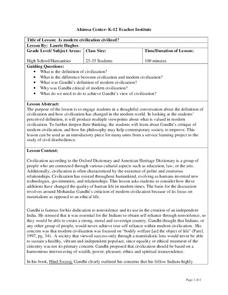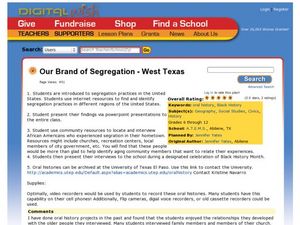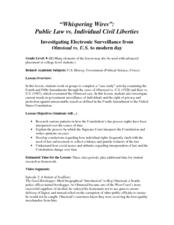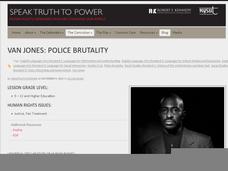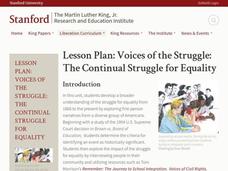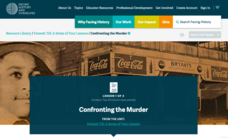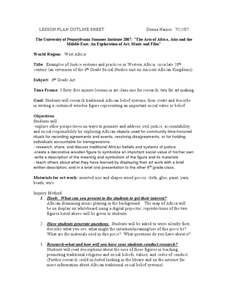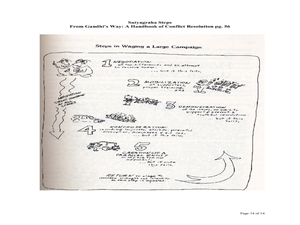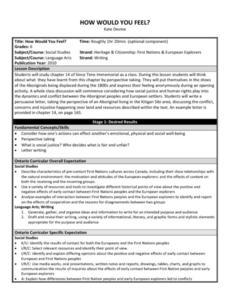Curated OER
Justice, Is it Fair?
Fifth graders investigate conflict resolution through the study of justice. In this justice lesson, 5th graders are put in scenarios of unfair conditions. Students discuss the unfair situations and their feelings about them....
Curated OER
Our Global Community
First graders experience literature which shows how communities live around the world. In this global community lesson plan, 1st graders read books such as Whoever You Are, by Mem Fox and create a work of art based on their feelings...
Curated OER
Pay it Forward
Students explore the basic concept of micro-financing. In this economics/literacy lesson, students listen to One Hen by Katie Smith, in which a small loan changes the life of the main character. Students employ comprehension strategies...
Curated OER
What’s your Name?
Youngsters work to build empathy, cultural understanding, and a sense of self as they uncover the story behind their own names. They read the book, The Name Jar, discuss immigration and how it feels to be in a new place. Then, they...
American Documentary
The Benefits and Drawbacks of Plea Bargains
The outcome of 90 percent of criminal cases in the US is determined by plea bargains. Clips from the documentary Better This World create the backdrop for an investigation of the benefits and drawbacks of the plea bargaining process....
Curated OER
Put Your Hands in Mine: King Day
Middle schoolers examine the concepts of human and civil rights. In this philanthropy lesson, students watch The Mighty Times: The Children March. Middle schoolers discuss concepts relating to civil rights and change.
Curated OER
Language Arts: Twinning At-Risk Students
Students at-risk in high school and primary grades pair up to read and write together. They create books modeled after authors and illustrators. They hold a parents' day to display their completed books.
Curated OER
Is Modern Civilization Civilized?
Students examine the concept of civility. For this modern civilization lesson, students study Gandhi's teaching about the attributes of civilized societies and discuss how they can contribute to fostering civilization in their own...
Curated OER
Culminating Writing Assessment: History
Students reflect on power, privilege, and standing in American society. In this writing skills lesson, students respond to the question, "If you are denied power, privilege, and equal standings with other Americans, how would you respond?"
Curated OER
Our Brand of Segregation - West Texas
Students explore the concept of segregation. For this oral history lesson, students conduct interviews and research primary sources to learn about segregation practices that affected African Americans. Students present their research...
Facing History and Ourselves
The Political Struggle, 1865-1866
Healing versus justice. The central source of tension following the United States Civil War was between the demands for healing and the demands for justice, the battle between President Andrew Johnson and Congress. A video introduces the...
Southern Poverty Law Center
Choosing Reliable Sources
It is more important than ever that 21st-century learners develop the skills they need to become savvy consumers of media. Young learners locate and identify reliable sources of information with a helpful media lesson.
Curated OER
Law in the Future
Students develop a legal system. In this justice system lesson, students examine case law in the Untied States and draw on that experience to create a legal system for a "moon colony" which integrates the legal systems on Earth.
Curated OER
Zen and the Art of Murder
Young scholars describe the importance of citizen involvement in the judicial system. They play the role of a witness to a crime scene by watching the video clip. Students discuss how differing eyewitness accounts can affect a police...
Curated OER
The Spread of Enlightenment Ideas
Looking for a simple and straightforward reference on the Enlightenment for your young historians? Check out this list of key terms and important figures from the period, followed by a traditional assessment where your learners will be...
Curated OER
"Whispering Wires": Public Law vs. Individual Civil Liberties
High school student love discussing controversial issues like those brought up in this fourth amendment case study. They examine the 1928 Olmstead vs. U.S. prohibition court case, applying the fourth amendment to determine whether...
Robert F. Kennedy Center for Justice and Human Rights
Van Jones: Police Brutality
Develop an understanding of how the media and society are connected and responsible for the defense of universal human rights. Learners investigate and examine the conflicts of police brutality as it is portrayed in the media and through...
Curated OER
Investigating the Harlem Renaissance
The work of Langston Hughes opens the door to research into the origin and legacy of the Harlem Renaissance and how the literature of the period can be viewed as a commentary on race relations in America. In addition, groups are assigned...
Stanford University
Voices of the Struggle: The Continual Struggle for Equality
As part of a study of the Civil Rights Movement from 1868 to the present, class members examine first person narratives, the Supreme Court case Brown v. Board of Education, and other significant events in civil rights history....
Curated OER
Friendship
Students investigate the concept of friendship as part of a four lessons unit which integrates literature with language arts, family life, social studies, or religious studies. Peace, cooperation, social justice, and multicultural...
Facing History and Ourselves
Emmett Till: Confronting the Murder
The 1955 murder of Emmett Till is often regarded as the catalyst for the Civil Rights Movement of the 20th century. Learn more about the brutal crime—and, as many believe, the miscarriage of justice—that began a national conversation...
Curated OER
Examples of Justice Systems and Practices in Western Africa
Tenth graders explore African belief systems. In this West African lesson, 10th graders research these belief systems. Students create a wooden figure that represents these beliefs.
Curated OER
Gandhi's Non-violent Revolutions: Examining Tools to Make Non-violent
Students analyze Gandhi's philosophy of nonviolent social change. For this nonviolence and social change lesson, students research a leader from the attached list who practiced nonviolent social change. Students write their own poem...
Curated OER
How Would You Feel?
Sixth graders put themselves in the shoes of aborigines who were displaced from their homes in the 1800s by Europeans who came in and took their land from them. They discuss the social injustices suffered by these people, and write...









